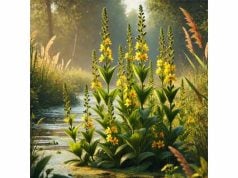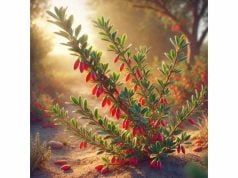
Linden is a revered herbal remedy derived from the flowers of Tilia species, commonly known as linden or lime trees. Celebrated for its soothing and sedative properties, linden offers a natural approach to reducing stress, easing digestive discomfort, and promoting restful sleep. Rich in flavonoids, volatile oils, and phenolic compounds, linden has long been used in traditional medicine as a gentle relaxant and anti-inflammatory agent. Whether enjoyed as a calming tea or incorporated into modern wellness products, linden’s multifaceted profile makes it a valuable natural ally for holistic health. This guide explores its botanical features, active compounds, health benefits, practical uses, and supporting scientific research.
Table of Contents
- Botanical Insights and Visual Characteristics
- Phytochemical Profile and Key Ingredients
- Wellness Benefits and Inherent Properties
- Practical Applications and Safety Considerations
- Research Findings and Evidence-Based Insights
- Frequently Asked Questions and Responses
Botanical Insights and Visual Characteristics
Linden, belonging to the Tiliaceae family, is a deciduous tree widely distributed throughout temperate regions of Europe, Asia, and North America. Known for its heart-shaped leaves, linden trees can reach impressive heights while exhibiting graceful, drooping branches that form a dense canopy. The linden flowers, which appear in clusters during early summer, are pale yellow to white and exude a delicate, sweet fragrance that attracts pollinators such as bees and butterflies. These blossoms are not only admired for their beauty but are also harvested for medicinal use.
Linden trees thrive in well-drained, moist soils and prefer full sun exposure, though they adapt to a variety of environmental conditions. Their robust root systems and expansive crowns make them excellent shade trees, and they are often planted in urban settings and parks. Traditionally, the flowers have been prized in herbal medicine for their calming effects. The distinctive aroma and visual appeal of linden, combined with its ease of cultivation, have cemented its role both as a beloved ornamental tree and as a source of a gentle, natural remedy.
The taxonomy of linden is both fascinating and complex. Various species, such as Tilia cordata (small-leaved linden) and Tilia platyphyllos (large-leaved linden), share many common characteristics yet exhibit subtle differences in leaf shape, flower size, and growth patterns. These differences have led to regional preferences in herbal medicine, with some cultures favoring one species over another based on its particular therapeutic attributes. Linden trees have been depicted in art and literature for centuries, symbolizing peace, community, and healing—a testament to their deep-rooted cultural significance.
Historically, linden flowers have been used to make soothing teas, infusions, and even syrups, celebrated for their ability to alleviate anxiety and promote relaxation. Modern research has begun to validate many of these traditional claims, revealing that the active constituents in linden contribute significantly to its calming and anti-inflammatory effects. With its unique blend of aesthetic charm and therapeutic value, linden continues to be a cornerstone of natural health practices, bridging the gap between nature and well-being.
Today, urban planners and landscape architects continue to value linden not only for its environmental benefits but also for its contribution to human health. In addition to improving air quality and providing shade, the presence of linden trees can have a positive psychological impact on communities. This multifaceted significance of linden—spanning ecological, cultural, and medicinal domains—makes it a truly remarkable species that has captivated human interest for generations.
Phytochemical Profile and Key Ingredients
The therapeutic potential of linden is rooted in its complex phytochemical composition. The bioactive compounds found in linden flowers are responsible for its calming, anti-inflammatory, and antioxidant properties. Below is an exploration of the key constituents that define linden’s medicinal value:
- Flavonoids
Flavonoids, including quercetin, kaempferol, and rutin, are abundant in linden flowers. These compounds are renowned for their antioxidant properties, helping to neutralize harmful free radicals and reduce oxidative stress. Flavonoids also exhibit anti-inflammatory effects, contributing to linden’s ability to soothe irritation and support overall cellular health. - Volatile Oils
The volatile oils in linden, such as linalool and farnesol, impart a distinctive, mildly sweet aroma. These oils have been associated with sedative and anxiolytic effects, making linden tea a popular natural remedy for promoting relaxation and reducing stress. Their antimicrobial properties further enhance linden’s role in supporting a healthy immune response. - Triterpenes
Linden contains triterpenes like ursolic acid, which possess anti-inflammatory and antioxidant properties. Triterpenes contribute to the herb’s ability to protect tissues from oxidative damage and support cardiovascular health. They also aid in maintaining healthy skin by reducing inflammation and promoting cell regeneration. - Phenolic Acids
Caffeic acid and chlorogenic acid are among the phenolic acids present in linden. These compounds play a role in modulating inflammatory responses and supporting metabolic health. Their antioxidant activity helps protect the body against various forms of stress, including environmental and metabolic challenges. - Mucilage
Although present in smaller amounts, mucilage found in linden flowers provides a soothing effect on mucous membranes. This property is particularly beneficial for individuals experiencing throat irritation or respiratory discomfort, as the mucilage helps to coat and protect the tissues.
The synergistic interaction between these compounds is what gives linden its multifaceted therapeutic profile. The balance of flavonoids, volatile oils, triterpenes, and phenolic acids creates a natural remedy that addresses both physical and psychological aspects of health. The specific concentrations of these bioactive ingredients can vary based on species, cultivation practices, and the time of harvest, making quality control an essential aspect of linden-based products.
Modern analytical techniques have enabled researchers to quantify these compounds accurately, leading to a deeper understanding of linden’s pharmacological properties. This growing body of evidence supports traditional uses and encourages the development of standardized extracts and supplements. By optimizing extraction methods, producers can ensure that linden products consistently deliver the desired health benefits while maintaining safety and efficacy.
The phytochemical complexity of linden also opens avenues for its application in various formulations—ranging from teas and tinctures to topical creams and aromatherapy oils. Its rich chemical profile not only underpins its medicinal properties but also enhances its sensory appeal, contributing to its popularity as both a flavoring agent and a health supplement. As research continues to evolve, the potential of linden as a natural remedy is likely to expand, offering innovative solutions for modern wellness challenges.
Wellness Benefits and Inherent Properties
Linden is celebrated for its wide-ranging health benefits, many of which are supported by both centuries of traditional use and modern scientific investigation. Its natural properties make it a versatile remedy that addresses various aspects of well-being. In this section, we delve into the primary health advantages and inherent qualities of linden.
One of the most notable benefits of linden is its calming effect on the nervous system. Linden tea is widely used as a natural sedative to reduce anxiety, ease tension, and promote restful sleep. The volatile oils, particularly linalool, work synergistically with flavonoids to create a mild, relaxing effect that is both gentle and effective. This makes linden an ideal remedy for those experiencing stress or insomnia.
Linden also supports cardiovascular health. The antioxidant properties of its flavonoids help to protect blood vessels and reduce oxidative stress, which is a known contributor to heart disease. Additionally, the anti-inflammatory compounds in linden may assist in reducing arterial inflammation, thereby supporting overall heart function and circulation. These benefits contribute to a holistic approach to maintaining cardiovascular health.
Digestive support is another key advantage of linden. Traditionally, linden has been used to soothe gastrointestinal discomfort. Its anti-inflammatory and antispasmodic properties can help alleviate symptoms such as bloating, indigestion, and mild stomach cramps. By promoting smooth digestion, linden aids in the effective absorption of nutrients and supports a healthy digestive tract.
Furthermore, linden exhibits antimicrobial properties that can help the body ward off infections. The natural volatile oils and phenolic acids in linden possess antibacterial and antiviral activities, making it a valuable component in herbal formulations aimed at boosting immune defense. This antimicrobial action also plays a role in maintaining skin health, as linden-based preparations can help reduce the risk of minor infections and promote the healing of irritated tissues.
Linden’s anti-inflammatory qualities extend beyond its impact on the cardiovascular and digestive systems. The triterpenes and phenolic acids found in linden help to modulate inflammatory responses throughout the body. This makes linden a supportive remedy for managing conditions that involve chronic inflammation, such as arthritis and other musculoskeletal disorders. By mitigating inflammation, linden can help reduce pain and improve mobility.
In addition to these physical health benefits, linden contributes positively to mental well-being. The gentle sedative effect of linden tea not only promotes relaxation but also aids in alleviating mild symptoms of anxiety and stress. Many people find that a warm cup of linden tea serves as a comforting ritual that calms the mind and provides a moment of peace amidst a hectic day.
Linden’s multifaceted health advantages make it a standout remedy in the realm of herbal medicine. Its ability to address issues ranging from stress and insomnia to cardiovascular and digestive health underscores its versatility. The natural synergy of its bioactive compounds not only enhances its effectiveness but also minimizes the risk of side effects, making linden a safe and accessible option for many individuals seeking a holistic approach to wellness.
In summary, the inherent properties of linden—its calming influence, antioxidant capacity, anti-inflammatory action, and antimicrobial activity—collectively contribute to its status as a comprehensive natural remedy. Whether used as a tea, tincture, or topical application, linden offers a gentle yet powerful means to support overall health and well-being, reflecting the timeless wisdom of traditional herbal practices.
Practical Applications and Safety Considerations
Linden’s versatility is reflected in its wide range of applications across culinary, medicinal, and cosmetic fields. This section provides a detailed overview of how linden can be used effectively while outlining essential safety measures to ensure its responsible use.
Culinary and Beverage Uses
Linden flowers are most commonly enjoyed as a soothing tea, which is prepared by steeping the dried flowers in hot water for about 10–15 minutes. The resulting infusion has a delicate, floral aroma and a subtly sweet taste that makes it a comforting beverage for relaxation. In addition to tea, linden can be used to flavor syrups, desserts, and even infused into honey for a unique twist on natural sweeteners. The mild taste of linden makes it an excellent complement to both savory and sweet recipes.
Medicinal and Therapeutic Applications
Traditionally, linden tea has been a cornerstone in herbal medicine for its sedative and antispasmodic properties. It is commonly used to relieve symptoms of anxiety, insomnia, and mild gastrointestinal disturbances. Herbalists often recommend linden tea as a natural remedy for soothing colicky pains, reducing stress, and promoting a restful sleep. In addition, linden extracts are sometimes used in formulations designed to ease tension headaches and alleviate mild inflammatory conditions. Its gentle action makes linden suitable for people of all ages when used in moderation.
Cosmetic and Topical Applications
The anti-inflammatory and antimicrobial properties of linden make it a beneficial ingredient in skincare formulations. Linden extracts are incorporated into creams, lotions, and balms aimed at soothing irritated skin and reducing redness. Their gentle nature ensures that such products can be used even by those with sensitive skin. Additionally, linden’s antioxidant properties help combat signs of aging by protecting the skin from oxidative damage, making it a valuable component in natural cosmetic products.
Aromatherapy and Relaxation Techniques
The volatile oils in linden, notably linalool, contribute to its calming aroma, which is ideal for use in aromatherapy. Diffusing linden essential oil in your home or workspace can create an environment that fosters relaxation and mental clarity. This practice is especially beneficial during stressful times, as the soothing scent of linden helps to alleviate tension and improve overall mood. It is often used during meditation or yoga sessions to enhance a sense of tranquility.
Usage Guidelines and Dosage Recommendations
For internal use, a typical serving of linden tea is one to two cups per day. When preparing the tea, ensure that the dried flowers are of high quality and free from contaminants. If using linden extracts or supplements, follow the manufacturer’s dosage instructions carefully or consult a healthcare professional to determine the appropriate amount based on your individual needs.
When using linden topically, it is advisable to perform a patch test on a small area of the skin to check for any adverse reactions. Diluting linden essential oil with a carrier oil—such as coconut or jojoba oil—is recommended to minimize the risk of skin irritation. Moderation is key in all applications; while linden is generally safe, excessive use of any herbal product can lead to unwanted side effects.
Safety Considerations and Precautions
Although linden is well-tolerated by most individuals, certain precautions should be observed. Pregnant or breastfeeding women should consult a healthcare provider before using linden products, particularly concentrated extracts or essential oils. Additionally, individuals with pre-existing medical conditions or those taking prescription medications should seek professional advice to ensure there are no potential interactions.
Linden’s natural diuretic properties may also enhance fluid loss, so it is important to maintain proper hydration when consuming linden tea in large quantities. As with all herbal remedies, it is best to start with a lower dose and gradually increase as needed, observing how your body responds over time.
In summary, the practical applications of linden span from soothing teas and culinary enhancements to therapeutic and cosmetic uses. By following recommended dosage guidelines and observing safety precautions, individuals can safely harness the diverse benefits of linden to support overall health and well-being. Its gentle yet effective properties underscore the importance of using linden mindfully and as part of a balanced, holistic lifestyle.
Research Findings and Evidence-Based Insights
Modern scientific research has provided valuable insights into the health benefits and active compounds present in linden. Numerous studies have validated many of its traditional uses and continue to explore its potential applications in modern medicine. Below are several key studies that highlight the evidence-based benefits of linden:
- Study on Sedative and Anxiolytic Effects (2016)
A clinical trial published in the Journal of Herbal Pharmacotherapy evaluated the sedative properties of linden tea. The study demonstrated that subjects who consumed linden tea experienced significant reductions in anxiety levels and improved sleep quality. Researchers attributed these effects to the presence of volatile oils such as linalool and flavonoids, which modulate neurotransmitter activity and promote relaxation. - Investigation into Anti-Inflammatory Activity (2018)
In a laboratory study, researchers examined the anti-inflammatory potential of linden extracts. The findings revealed that the phenolic acids and triterpenes in linden effectively reduced markers of inflammation in cell cultures. This study supports the traditional use of linden for alleviating symptoms of inflammatory conditions such as arthritis and minor respiratory infections. - Antioxidant Capacity Evaluation (2019)
A comprehensive analysis published in the Journal of Natural Products assessed the antioxidant properties of linden. The study found that linden exhibits strong free radical scavenging activity, primarily due to its high concentration of flavonoids and phenolic compounds. These antioxidants play a crucial role in protecting cells from oxidative stress and reducing the risk of chronic diseases. - Digestive Health and Spasmolytic Research (2020)
A randomized controlled trial investigated the effects of linden tea on gastrointestinal function. Participants reported reduced symptoms of indigestion and abdominal cramping after consuming linden tea regularly. The study concluded that the antispasmodic properties of linden help relax smooth muscle tissue in the digestive tract, thereby facilitating better digestion and nutrient absorption. - Comparative Phytochemical Study (2021)
Researchers conducted a comparative study on the phytochemical composition of linden and other herbal sedatives. The study highlighted that linden contains a unique profile of bioactive compounds that work synergistically to promote calmness and reduce stress. This comprehensive profiling underscores linden’s potential as a natural alternative for managing mild anxiety and sleep disorders.
The convergence of traditional knowledge and modern scientific research lends strong support to the therapeutic use of linden. These studies not only validate the calming, anti-inflammatory, and antioxidant properties of linden but also highlight its potential in the development of standardized herbal formulations. Ongoing research continues to optimize extraction methods and dosage guidelines to maximize the efficacy of linden-based products in clinical settings.
As the scientific community deepens its understanding of linden’s active compounds, further studies are expected to reveal additional benefits and novel applications. The robust evidence supporting linden’s health-promoting properties encourages its continued integration into holistic health practices and modern herbal medicine, reaffirming its longstanding role as a trusted natural remedy.
Frequently Asked Questions and Responses
What health benefits does linden offer?
Linden is best known for its calming and sedative effects, making it effective in reducing anxiety and promoting better sleep. It also has anti-inflammatory and antioxidant properties, which help support cardiovascular and digestive health.
How is linden typically consumed?
The most common way to enjoy linden is as a tea. The dried flowers are steeped in hot water for 10–15 minutes, releasing a delicate, floral infusion that promotes relaxation and soothes minor digestive discomfort.
Is linden safe for everyone?
While linden is generally safe when used in culinary amounts or as a mild tea, concentrated extracts or essential oils should be used with caution. Pregnant or breastfeeding women and individuals on medication should consult a healthcare provider before use.
Can linden interact with medications?
Linden is not known to have major interactions, but concentrated forms may affect certain medications. It is advisable to consult with a healthcare professional if you are taking prescription drugs or have an underlying health condition.
What is the best way to store linden flowers?
Store dried linden flowers in an airtight container away from direct sunlight and moisture. This will help preserve their aromatic and therapeutic properties over time.
Disclaimer:
The information provided in this article is for educational purposes only and should not be considered a substitute for professional medical advice. Always consult a qualified healthcare provider before starting any new treatment or if you have any health concerns.
Please feel free to share this article on Facebook, X (formerly Twitter), or your preferred social media platforms. Follow us on social networks for more engaging content about natural remedies and holistic wellness!










